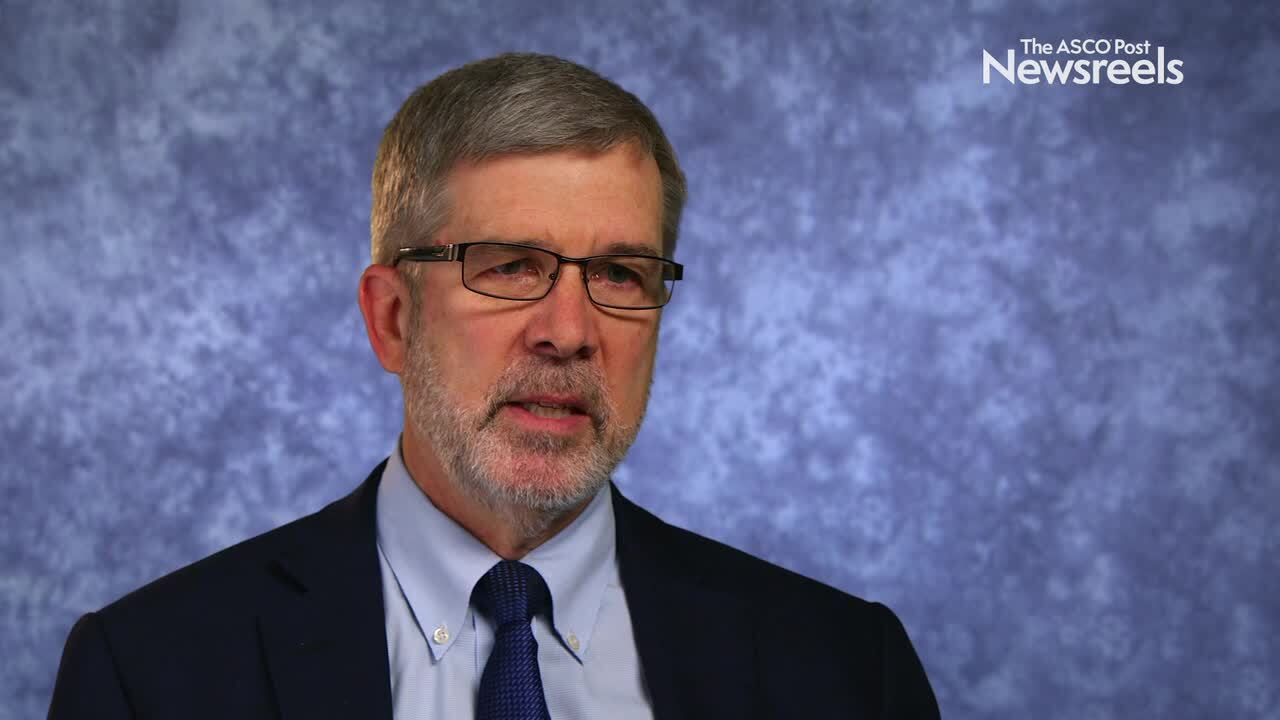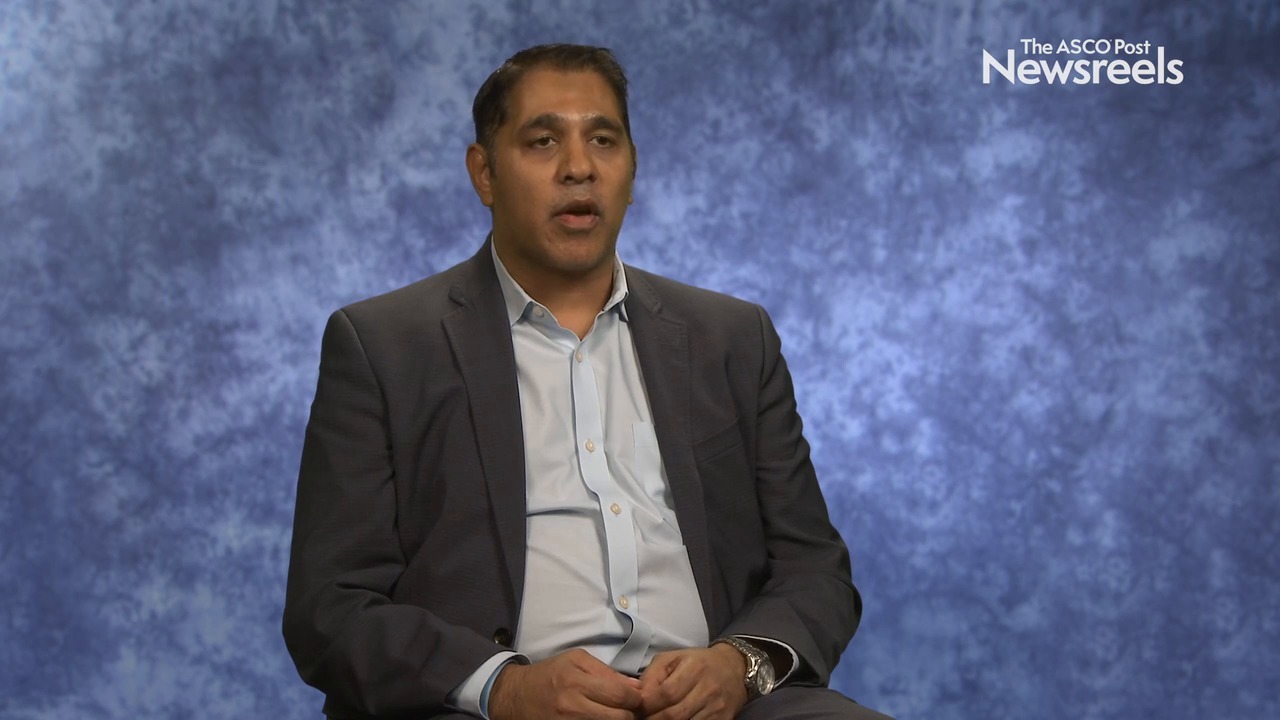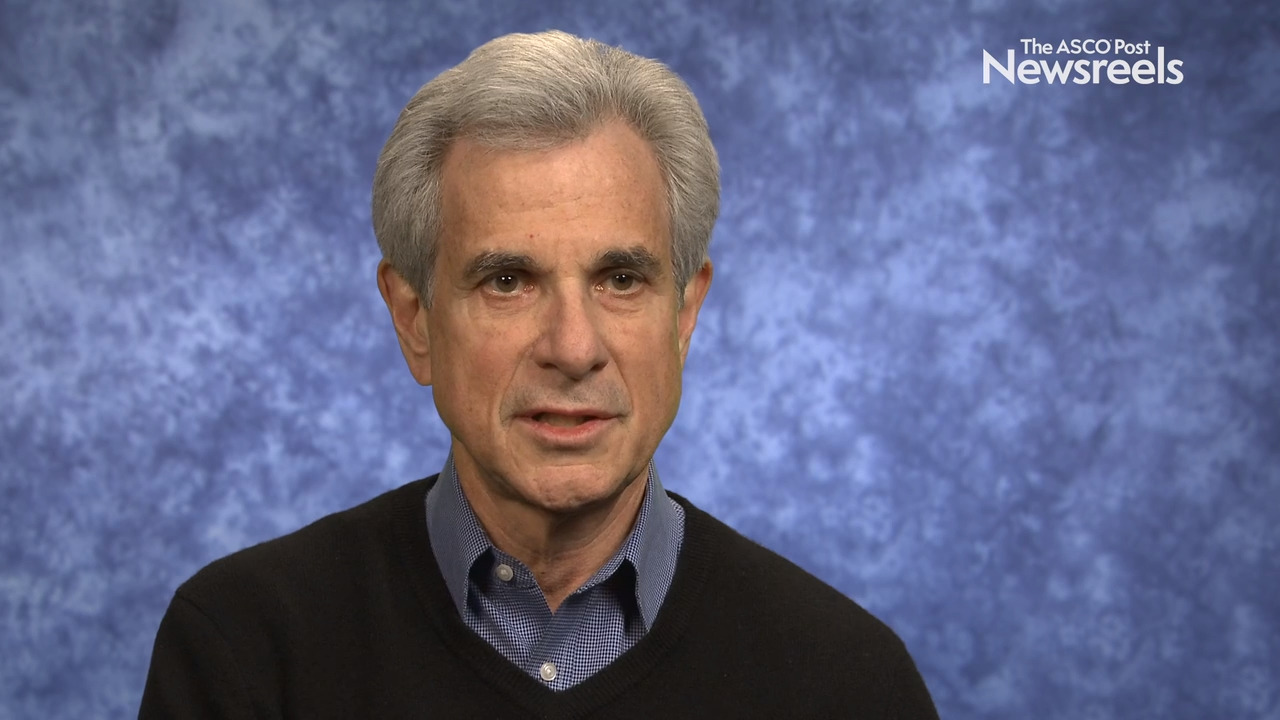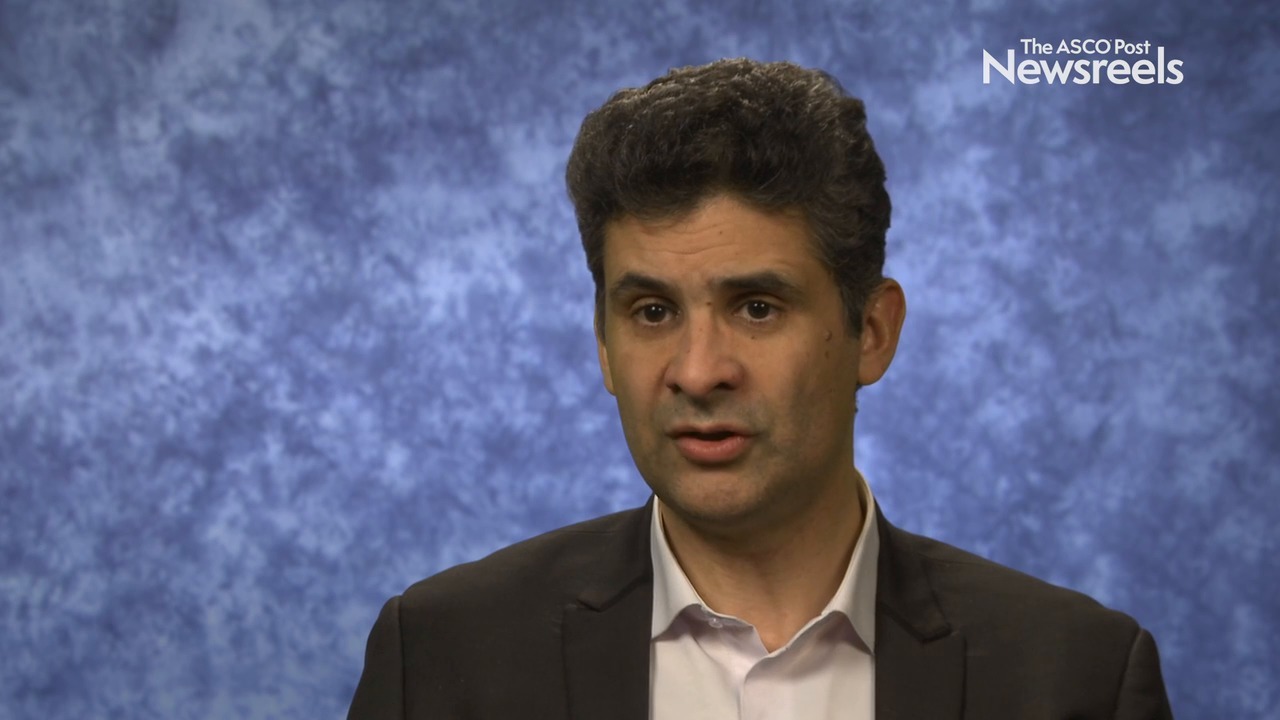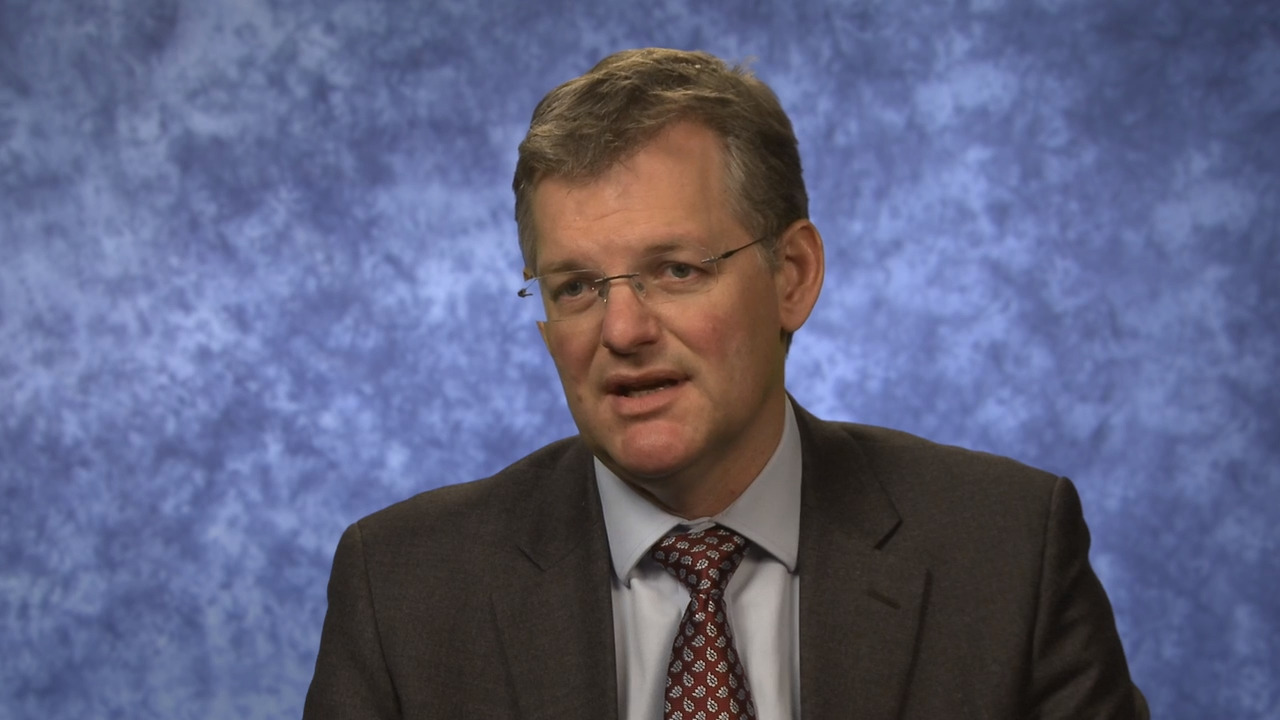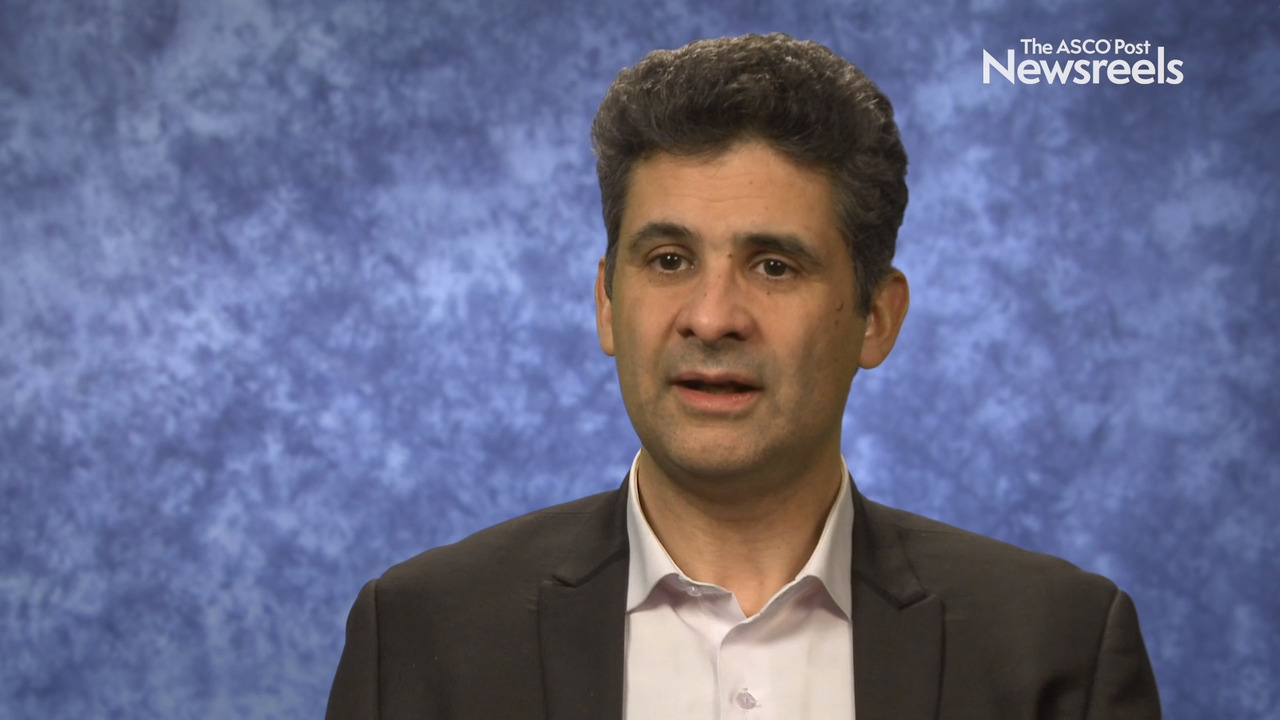Enzalutamide Plus Androgen Deprivation Therapy in Metastatic Hormone-Sensitive Prostate Cancer
Adding enzalutamide to androgen-deprivation therapy (ADT) significantly prolonged radiographic progression-free survival in men with metastatic hormone-sensitive prostate cancer, reducing the risk of disease progression or death by 61% compared with ADT plus placebo, according to the results of the ...
LATITUDE Trial in Newly Diagnosed, Metastatic Prostate Cancer: Final Overall Survival Analysis
As reported in The Lancet Oncology by Karim Fizazi, MD, PhD, and colleagues, the final overall survival analysis in the phase III LATITUDE trial has shown a significant benefit with the addition of abiraterone acetate plus prednisone to androgen deprivation therapy (ADT) in newly diagnosed,...
NCCN Clinical Practice Guidelines in Oncology: 2019 Updates
In 1996, the National Comprehensive Cancer Network® (NCCN®) published its first set of Clinical Practice Guidelines in Oncology (NCCN Guidelines®), covering eight tumor types. NCCN Guidelines are now published for more than 70 tumor types and topics. Some of the key updates for 2019 were presented...
A Year in Review
The past year has seen groundbreaking advances in the treatment of genitourinary (GU) cancers, which in some cases are resulting in altering the standard of care for patients with renal cell carcinoma, prostate cancer, and urothelial carcinoma. Some of the biggest changes that have occurred are for ...
ASTRO and AUA Announce Updates to Joint Clinical Guidance for Adjuvant and Salvage Radiotherapy After Prostatectomy
The American Society for Radiation Oncology (ASTRO) and the American Urological Association (AUA) recently announced updates to their joint clinical guideline on adjuvant and salvage radiotherapy after prostatectomy in patients with and without evidence of prostate cancer recurrence to include new...
Alcohol Intake and Risk of Lethal Prostate Cancer
As reported by Downer et al in the Journal of Clinical Oncology, findings from the Health Professionals Follow-up Study indicate that moderate alcohol consumption is safe for patients with prostate cancer. Study Details The prospective cohort study used data from the Health Professionals...
AUA 2019: Insights in Prostate Cancer Identification and Management
Prostate cancer diagnosis and treatment are ever-changing, with new research showcasing different ways to identify and manage patients with the disease. Three new abstracts—highlighting how beta-blockers may impact prostate cancer risk, the advantages and disadvantages of using magnetic...
ESTRO 38: REQUITE Project Finds Predictive Biomarkers for Late Radiotherapy Toxicity
The latest results from the REQUITE project, which aimed to discover what makes patients more likely to experience adverse effects after radiotherapy, have shown that a combination of biologic markers and certain genetic changes can predict radiation sensitivity. In addition, the international team ...
ESTRO 38: High–Dose Rate Brachytherapy in Localized Prostate Cancer
A single high dose of radiation that can be delivered directly to a treatment site within a few minutes is a safe and effective technique for treating men with localized, low-risk prostate cancer, according to a study presented by Tharmalingam et al at ESTRO 38, the annual congress of the ...
FDA Pipeline: Applications and Designations in Prostate Cancer, Leukemia, and HER2-Positive Cancers
In the past 2 weeks, the U.S. Food and Drug Administration (FDA) accepted a new drug application and granted Priority Review for a prostate cancer treatment, granted Orphan Drug designation to a treatment for acute lymphoblastic leukemia, accepted an investigational new drug application for a...
Final Overall Survival Analysis of the LATITUDE Trial in Newly Diagnosed, High-Risk, Metastatic, Castration-Sensitive Prostate Cancer
As reported in The Lancet Oncology by Fizazi et al, the final overall survival analysis in the phase III LATITUDE trial has shown a significant benefit with the addition of abiraterone acetate plus prednisone to androgen deprivation therapy (ADT) in newly diagnosed, high-risk, metastatic, ...
Nivolumab Combined With Ipilimumab Shows Activity in Prostate Cancer Subsets
In contrast with melanoma, lung cancer, and kidney cancer, immune checkpoint inhibitor therapy has been disappointing in prostate cancer thus far. Because of success in treating other tumor types, interest remains high in exploring the effect of immunotherapy with checkpoint inhibition in prostate...
Enzalutamide Plus ADT Extends Progression-Free Survival in Metastatic Hormone-Sensitive Prostate Cancer
Adding enzalutamide to androgen-deprivation therapy (ADT) significantly prolonged radiographic progression-free survival in men with metastatic hormone-sensitive prostate cancer, reducing the risk of disease progression or death by 61% compared with ADT plus placebo, according to the results of the ...
CheckMate 650: Nivolumab and Ipilimumab in Metastatic, Castration-Resistant Prostate Cancer
SOME PATIENTS with metastatic prostate cancer may respond to a combination of immune checkpoint inhibitors after treatment with hormonal therapy and chemotherapy is not successful, according to early results from the phase II CheckMate 650 trial. Principal Investigator Padmanee Sharma, MD, PhD,...
SBRT vs Conventionally Fractionated, or Moderately Hypofractionated External-Beam Radiotherapy, for Localized Prostate Cancer
TREATMENT WITH stereotactic body radiation therapy (SBRT) results in a similar safety profile to conventionally fractionated, or moderately hypofractionated external-beam radiotherapy, in men with low- or intermediate- risk prostate cancer, according to preliminary results of the Prostate Advances ...
Expert Point of View: Ian Davis, MBBS (Hons), PhD, FRACP, FAChPM
ALTHOUGH ARCHES was a positive trial, results may not signal a practice change at this time, according to formal discussant Ian Davis, MBBS (Hons), PhD, FRACP, FAChPM, Monash University Eastern Health Clinical School, Melbourne. “We should proceed with caution and probably not change practice yet,” ...
Interim Analysis of the ARCHES Trial: Enzalutamide Plus Androgen-Deprivation Therapy for Metastatic Hormone-Sensitive Prostate Cancer
ADDING ENZALUTAMIDE to androgen-deprivation therapy (ADT) significantly prolonged radiographic progression-free survival in men with metastatic hormone-sensitive prostate cancer, reducing the risk of progression or death by 61% compared with ADT plus placebo, according to results of the phase III...
Expert Point of View: Ian Davis, MBBS (Hons), PhD, FRACP, FAChPM
THE FORMAL discussant of the ARAMIS trial, Ian Davis, MBBS (Hons), PhD, FRACP, FAChPM, of Monash University and Eastern Health, Melbourne, commented: “ARAMIS is a positive trial with encouraging early results. It has a meaningful endpoint of metastasis-free survival with acceptable toxicity....
ARAMIS Trial: Darolutamide in High-Risk Nonmetastatic Prostate Cancer
THE INVESTIGATIONAL androgen receptor inhibitor darolutamide significantly improved metastasis-free survival in men with high-risk nonmetastatic castration-resistant prostate cancer vs placebo in the large phase III ARAMIS trial.1 Men treated with darolutamide had a median metastasis-free survival...
Conference Highlights From the 2019 Gastrointestinal and Genitourinary Cancers Symposiums
THIS YEAR saw a huge turnout and a large number of scientific abstracts presented at both the 2019 Gastrointestinal (GI) Cancers Symposium, held on January 17–19, and the 2019 Genitourinary (GU) Cancers Symposium, held on February 14–16, both in San Francisco. The GU Cancers Symposium attracted...
Risk of Subsequent Primary Cancers After Carbon Ion Radiotherapy for Localized Prostate Cancer
In a Japanese retrospective study reported in The Lancet Oncology, Mohamad et al found that carbon ion radiotherapy was associated with a lower risk of subsequent primary cancers compared with photon radiotherapy in patients with localized prostate cancer. The study included data on 1,455 patients ...
ASCO Endorses Active Surveillance Guideline for Low-Risk Prostate Cancer
ASCO ENDORSES and reinforces the evidence-based American Urological Association (AUA), American Society for Radiation Oncology (ASTRO), and the Society of Urologic Oncology (SUO) Guideline published in 2018 in the Journal of Urology. ASCO’s endorsement of a guideline on clinically localized...
Prostatectomy vs Watchful Waiting: Clinical Dilemma Centers on Aggressive vs Indolent Disease
THE MANAGEMENT of localized prostate cancer remains controversial. Although the widespread use of prostate-specific antigen (PSA) testing has resulted in a dramatic increase in the diagnosis and treatment of prostate cancer, many men do not benefit from intervention because the disease is either...
Radical Prostatectomy or Watchful Waiting: 29-Year Follow-up of Scandinavian Trial
AS REPORTED in The New England Journal of Medicine by Anna Bill-Axelson, MD, PhD, Lars Holmberg, MD, PhD, both of Uppsala University Hospital, and and colleagues, the 29-year follow-up of the Scandinavian Prostate Cancer Group Study Number 4 (SPCG-4) trial has shown that radical prostatectomy is...
Expert Point of View: Emmanuel S. Antonarakis, MD
EMMANUEL S. ANTONARAKIS, MD, Associate Professor of Oncology, Johns Hopkins University, Baltimore, commented on the state of current knowledge about poly (ADP-ribose) polymerase (PARP) inhibitors in prostate cancer. “PARP inhibitors are definitely making inroads in the management of patients with...
PARP Inhibitors Moving Ahead in Prostate Cancer
MULTIPLE POLY (ADP-ribose) polymerase (PARP) inhibitors are under study in metastatic prostate cancer and no clear winner has emerged yet. Some studies suggest that the best use of PARP inhibitors may be in patients whose cancers harbor DNA-repair defects and BRCA1/2 mutations, but other data...
Addition of Docetaxel to Androgen Suppression and Radiotherapy for Localized High-Risk Prostate Cancer
As reported in the Journal of Clinical Oncology by Rosenthal et al, the phase III NRG Oncology RTOG 0521 trial showed that the addition of docetaxel to androgen suppression and radiotherapy improved overall and disease-free survival as well as the distant metastasis rate in patients with high-risk...
Focal Laser Ablation in Prostate Cancer
Researchers have shown that selectively destroying cancerous prostate tissue may be as effective as complete prostate removal or radiation therapy, while preserving more sexual and urinary function than these other treatments. The study was published by Wasler et al in the Journal of Vascular and...
James L. Mohler, MD, on Managing Prostate Cancer: NCCN Guidelines Updates
James L. Mohler, MD, of the Roswell Park Comprehensive Cancer Center, discusses updated recommendations in prostate cancer: more specificity for family history and genomic sequencing, as well as the evolving uses of androgen-deprivation therapy.
AR-V7 Assay Findings and Outcomes With Hormone Therapy in High-Risk Castration-Resistant Prostate Cancer
In the PROPHECY study, reported in the Journal of Clinical Oncology, Armstrong et al found that positive findings on 2 assays for circulating tumor cell (CTC) androgen receptor splice variant 7 (AR-V7) were associated with poorer outcomes for abiraterone and enzalutamide therapy in men with...
Docetaxel Plus Androgen-Deprivation Therapy After Primary Local Therapy in High-Risk Prostate Cancer
In a French phase III trial reported in JAMA Oncology, Stéphane Oudard, MD, PhD, of Hôpital Européen Georges Pompidou, and colleagues found that the addition of docetaxel to androgen-deprivation therapy (ADT) did not improve prostate-specific antigen (PSA) progression-free survival in men with...
Patient-Reported Outcomes With Enzalutamide Treatment in Nonmetastatic Castration-Resistant Prostate Cancer
As reported by Bertrand Tombal, MD, of the Cliniques Universitaires Saint-Luc, Université Catholique de Louvain, and colleagues in The Lancet Oncology, treatment with enzalutamide was associated with clinically meaningful delays in pain progression, symptom worsening, and deterioration in...
EAU 2019: Testosterone Replacement Therapy May Slow Recurrence in Low-Risk Prostate Cancer
Researchers have shown that testosterone replacement may slow the recurrence of prostate cancer in low-risk patients. Findings from the study were presented by Towe et al at the European Association of Urology (EAU) 2019 Congress (Abstract 646). Practitioners have long regarded testosterone as a...
Viral Vector–Based Immunotherapy in Metastatic Castration-Resistant Prostate Cancer
In a phase III trial reported in the Journal of Clinical Oncology, Gulley et al found that PROSTVAC, a viral vector-based immunotherapy, did not improve overall survival or 6-month event-free survival vs placebo in patients with asymptomatic or minimally symptomatic metastatic castration-resistant...
Intense Neoadjuvant Androgen Deprivation Before Prostatectomy in Locally Advanced Prostate Cancer
In a phase II trial reported in the Journal of Clinical Oncology, McKay et al found a trend toward improved pathologic response or minimal residual disease with the addition of neoadjuvant abiraterone and prednisone to enzalutamide and leuprolide prior to radical prostatectomy in patients with...
Prevalence of Adverse Germline Genetic Variants in Prostate Cancer
In a study reported in JAMA Oncology by Nicolosi et al, it was found that 17% of men with prostate cancer had likely deleterious germline genetic variants, and that many of these men would not have been considered candidates for genetic testing. Study Details The study involved data from 3,607...
ARAMIS Trial Reports Darolutamide Improves Outcomes in High-Risk Nonmetastatic Prostate Cancer
Darolutamide—an investigational androgen receptor inhibitor—significantly improved metastasis-free survival in men with high-risk nonmetastatic castration-resistant prostate cancer vs placebo in the large phase III ARAMIS trial.1 Men treated with darolutamide had a median metastasis-free survival...
Radioligand Therapy Achieves Responses in Metastatic Prostate Cancer
In a prospective, single-center, single-arm phase II trial reported at the 2019 Genitourinary Cancers Symposium, a novel approach using a tumor-specific radioligand therapy that binds to prostate-specific membrane antigen (PSMA) (lutetium-177 PSMA-617 -[LuPSMA]) achieved responses in a majority of...
AACR 2019: Does Treatment With Abiraterone Acetate Benefit Patients With Advanced Prostate Cancer and Preexisting Cardiovascular Disease?
Patients with advanced prostate cancer who had preexisting cardiovascular disease had a higher risk of mortality in the 6 months after starting abiraterone acetate treatment compared with those who had no preexisting cardiovascular disease, according to data presented by Lu-Yao et al at a presscast ...
Addition of Radium-223 to Abiraterone Acetate and Prednisone or Prednisolone in Metastatic Castration-Resistant Prostate Cancer
In the phase III ERA 223 trial reported in The Lancet Oncology, Smith et al found that the addition of radium-223 to abiraterone acetate and prednisone or prednisolone did not improve symptomatic skeletal event-free survival and was associated with increased risk of fracture in patients with...
Addition of Docetaxel to Hormone Therapy in High-Risk Prostate Cancer With Rising PSA Levels
In a French phase III trial reported in JAMA Oncology, Oudard et al found that the addition of docetaxel to androgen-deprivation therapy (ADT) did not improve prostate-specific antigen (PSA) progression-free survival in men with high-risk prostate cancer with rising PSA after primary local therapy. ...
Patient-Reported Outcomes With Enzalutamide in PROSPER Trial
As reported by Tombal et al in The Lancet Oncology, treatment with enzalutamide was associated with clinically meaningful delays in pain progression, symptom worsening, and deterioration in functional status vs placebo in the phase III PROSPER trial in nonmetastatic, castration-resistant prostate...
Hospitalizations in Patients With Prostate Cancer on Medicare
In a retrospective analysis reported in the Journal of Oncology Practice, Parikh et al found that more than one-quarter of hospitalizations in Medicare patients with prostate cancer were potentially avoidable. Study Details The study involved 99 evaluable patients in the Mount Sinai Health System ...
Sumit K. Subudhi, MD, PhD, on Prostate Cancer: Results From the CheckMate 650 Trial on Nivolumab and Ipilimumab
Sumit K. Subudhi, MD, PhD, of The University of Texas MD Anderson Cancer Center, discusses the initial results from a phase II study of nivolumab plus ipilimumab in the treatment of metastatic castration-resistant prostate cancer (Abstract 142).
Howard I. Scher, MD, on Prostate Cancer: Circulating Tumor Cells as a Surrogate Endpoint for Survival
Howard I. Scher, MD, of Memorial Sloan Kettering Cancer Center, discusses circulating tumor cell number as a transitional surrogate endpoint for survival in phase II trials on metastatic castration-resistant prostate cancer (Abstract 143).
Silke Gillessen, MD, on Prostate Cancer: Results From the REDUSE Trial on Denosumab
Silke Gillessen, MD, of Cantonal Hospital St. Gallen, discusses data from a phase III study on the incidence of hypocalcemia in patients with castration-resistant prostate cancer treated with denosumab. The trial was designed to assess prevention of symptomatic skeletal events with denosumab administered every 4 weeks vs every 12 weeks (Abstract 139).
Karim Fizazi, MD, PhD, on Prostate Cancer: Results From the ARAMIS Trial on Darolutamide
Karim Fizazi, MD, PhD, of the University of Paris-Sud and Gustave Roussy, discusses study findings on the efficacy and safety of darolutamide in men with nonmetastatic castration-resistant prostate cancer (Abstract 140).
Nicholas J. van As, MD, on Prostate Cancer: Results From the PACE-B Trial Comparing Radiotherapy Techniques
Nicholas J. van As, MD, of The Royal Marsden NHS Foundation Trust, discusses an analysis of acute toxicity in the PACE-B study, which compared stereotactic body radiotherapy with conventionally fractionated or moderately hypofractionated external-beam radiotherapy for localized prostate cancer (Abstract 1).
Karim Fizazi, MD, PhD, on Prostate Cancer: Results From the LATITUDE Trial on Abiraterone Acetate Plus Prednisone
Karim Fizazi, MD, PhD, of the University of Paris-Sud and Gustave Roussy, discusses final phase III findings on men with newly diagnosed, high-risk, metastatic, castration-naive prostate cancer who were treated with abiraterone acetate plus prednisone added to androgen-deprivation therapy (Abstract 141).
2019 GU Cancers Symposium: ARAMIS: Darolutamide in Nonmetastatic, Castration-Resistant Prostate Cancer
In the phase III ARAMIS trial reported by Fizazi et al at the 2019 Genitourinary Cancers Symposium (Abstract 140) and simultaneously published in The New England Journal of Medicine, researchers found that the androgen receptor antagonist darolutamide significantly prolonged metastasis-free...
